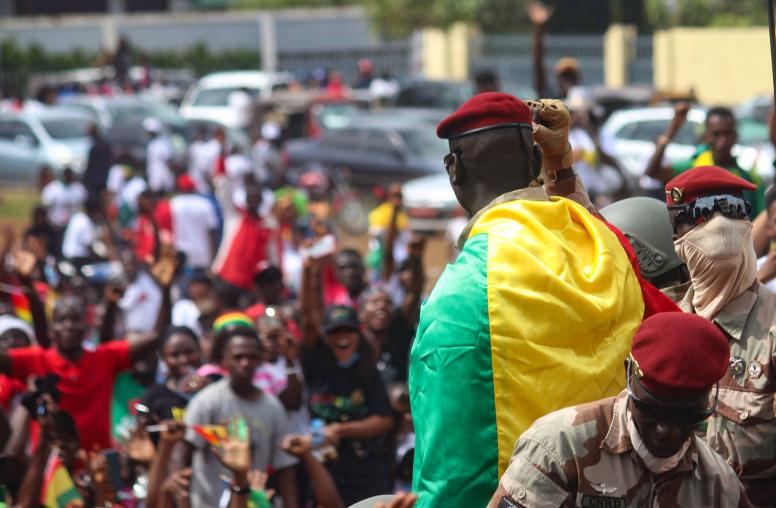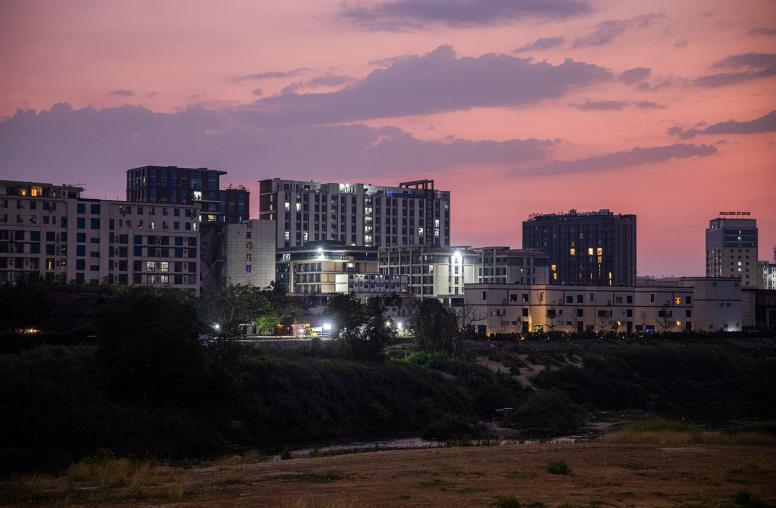Countering Coups: How to Prevent Armed Seizures of Power
Five military coups around the Sahel show the U.S. needs better policies. Here are three first steps.
Armies have seized power in five states of the greater Sahel over nine months, cementing this African region as the most pronounced center of a global crisis. The Sahel’s military coups d’état are an acute symptom of poor and authoritarian governance that is breeding extremism and transnational criminality, igniting violence and undermining efforts to build democracies. These crises highlight widening security risks for the Sahel’s 135 million people and ultimately for Europe and the United States. Congress has begun urgently needed policy changes that analysts say should now be accelerated to prevent further coups and to buttress stability and democracy.

The urgency for the United States and other democracies could not be greater, for the rising danger is that the pattern of coups may spread to larger, more developed and traditionally stable African nations. To pinpoint the policy changes that can help democracies better prevent coups, USIP is polling its own experts and those across the foreign policy community in a series of articles and a public forum to spotlight the most vital steps. Below, USIP specialists offer three ways to help nations avoid military coups; a companion analysis will examine steps to help reverse them when they have occurred.
The United States should end the delay in implementing the 2019 Global Fragility Act.
USIP’s Thomas P. Sheehy writes: The United States took a great—and bipartisan—step in 2019 toward helping prevent coups by passing the Global Fragility Act. This law mandates an overhaul that will better coordinate and strengthen all U.S. efforts to counter the economic, social and justice problems that lead to coups, as well as to violence and extremism.
But a law is only as good as its implementation, which has been delayed. The Global Fragility Act required the administration to designate, by December 2020, at least five priority countries, and to submit to Congress specific plans for newly coordinated U.S. action in each country to prevent violence and strengthen stability. Africa’s coups are a flashing, red warning about the dangers of further delay. The administration should unstick the implementation process, with the necessary oversight by Congress and engagement with those in civil society who pushed for passage of this vital law. And of course, going forward, the U.S. government will need to sustain the dialogue among agencies, administration and Congress, and provide the resources to effectively implement the Global Fragility Strategy created by the 2019 law.
One point to note about the proliferation of coups and the stalled U.S. implementation of the better strategy for preventing them: In many fragile countries, including those suffering coups, the growing role of outside actors should be a concern. Russia is increasingly active and hostile to democracy and stability in several African countries, including Mali. China may engage with, but certainly does not support, the democratic, inclusive, accountable government that promotes peace and stability. Other countries gaining influence in Africa are indifferent to democratic values. The United States gave itself a strengthened tool for responding with the Global Fragility Act. So how quickly and how well can we now put that tool to work?
The United States can more vigorously use its newly improved instrument for boosting business, economies and thus stability in fragile states facing violence and the risk of coups.
USIP's Edward A. Burrier writes: While the security and political dynamics in Mali, Chad, Guinea, Sudan and Burkina Faso vary, these coup-plagued countries share, with many others in Africa, a destabilizing lack of economic opportunity, particularly for their burgeoning youth populations. Many Americans don’t realize that Congress has mustered a bipartisan consensus in recent years to strengthen our ability to help unstable, violence-afflicted states—not only with the Global Fragility Act, but also by overhauling the way America uses investment to help such fragile countries.
A 2018 law modernized two U.S. agencies to create the U.S. International Development Finance Corporation (DFC), which is far nimbler for the urgent task of injecting investment into economies starved for the cash to fertilize entrepreneurship. DFC partners with the private sector, using loans, insurance, equity investments and other tools to finance projects in emerging markets for development impact. Congress authorized the DFC to lend up to $60 billion, twice the amount of its predecessor, in a step that was widely described as a U.S. counter to China’s Belt and Road Initiative.
Arguably, no region needs the therapy of investment more than the impoverished Sahel. Coups, like violent conflicts and extremism, breed in the popular despair when entire populations are fenced off from the economic opportunities they can see elsewhere in the world. A high-impact response would help local banks and institutions in fragile regions offer relatively small loans that can bolster struggling, yet viable, small businesses. In its first two years of operation, DFC has begun this focused effort. Policymakers across the U.S. government, allied democracies and international institutions should watch closely its impact, with an eye to sustaining, joining and improving it.
In the last year, DFC has targeted the Sahel with an act of partnership that illustrates what is needed. A DFC loan guarantee to the Dutch organization Stichting Cordaid, will enable it to lend at least $37 million, DFC said, “to 50 small and medium enterprises and eight microfinance institutions by 2025, supporting at least 2,100 new jobs and 8,000 microentrepreneurs” in Burkina Faso, Guinea, Mali and Sierra Leone. As well, the DFC recently announced a $20 million loan to the International Bank of Liberia – again to increase the access to capital that small businesses in this fragile country need to succeed.
DFC and its supporters should intensify coordinated efforts among U.S. and European development finance institutions and multilateral banks to support the economic growth that is a prerequisite for building stable societies and democratic governance. In the longer term, the United States should use its economic and development resources to promote the better primary, secondary and vocational education that can create literate, numerate (and digitally literate) populations that can become and remain competitive and economically independent in a 21st-century economy. The danger continues to grow—so the time to spur economic growth in and around the Sahel is now.
The United States and other donors need to overhaul their assistance for military and security institutions abroad, strengthening their governance along with their capacities.
As the Global Fragility Act and the International Development Finance Corporation update practices in development assistance, a similar overhaul is needed for security assistance, according to USIP’s Emily Cole and Ena Dion:
In a region simmering with extremist violence and instability, it’s unsurprising that the United States, France and other democracies provide equipment and training for military and police forces at the same time they offer support for democracy and peacebuilding. But a painful irony is that four of the five coups in the greater Sahel this past year—those in Chad, Guinea, Mali and Burkina Faso— were committed by military officers who had received training from U.S. or French forces, or both. This reversal underscores that when democracies help strengthen state forces in violence-afflicted countries, we must focus as much on strengthening the forces’ governance as their “kinetic” capacities.
Yet for years in the Sahel, U.S. and international security assistance effectively strengthened military and police forces’ power relative to the civilian governments and populations they are supposed to serve. A preference for investing in “hard power” over democracy and governance makes coups and other anti-democratic actions more likely. Ultimately, it undermines U.S. and European security goals in the region.
Providing such imbalanced security assistance arises from two errors: misreading fragile states’ insecurity as technical problems when they are in reality political problems, and focusing too narrowly on short-term security imperatives, rather than longer-term peace and stability. It’s worth noting that 58 percent of U.S. security assistance to the Sahel goes to “train and equip” state forces, and most of the rest supports international peacekeeping operations. Relatively little is focused on building a culture of democratic, civilian governance. Investing in making militaries more lethal without working to create accountability and strengthen civilian control and democratic institutions leads to two negative policy outcomes:
- Militaries with outsized strength mutiny or take power in coups.
- Civilian governments fearful of their own militaries may promote officers to protect the government’s safety—a step that Burkina Faso analysts saw at work before that country’s coup last month. Or governments may offer military leaders opportunities for corruption and patronage to buy their loyalty, further undermining democratic norms and institutions.
In both situations, countries dedicate too much of their meager national budgets to security (often at the urging of U.S. and international partners). This further reduces public services and alienates populations. An approach that is not simply “security first” but “security only” is likely to backfire by further eroding democratic norms and accountability leaving countries more vulnerable to violent extremist violence.



